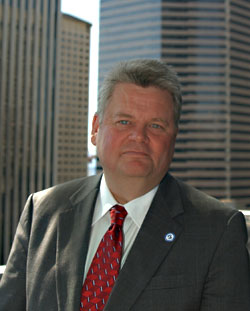Last week was Global Warming Week in Seattle. On Friday, March 27, former Vice President Al Gore was in town, burnishing Mayor Greg Nickels’ green credentials as they talked about ways to reduce global warming. Two days earlier, King County Executive Ron Sims came out with his plan to cut county greenhouse gas emissions. The timing of the release, Sims said, was (wink, wink, nudge, nudge) “accidental.”
To which I have only one question: Where the hell have you guys been?
Don’t get me wrong. I love that first Nickels and now Sims have put themselves among the forefront of local elected officials around the country who are trying to help pick up the slack for the truly criminal failure of the Bush administration to do anything to curb global warming. Of all the crimes of the Bush administration, the five (and counting) years of indifference to global warming have had profound implications for the future of our species. While most of the rest of the world has been scrambling to at least try to meet the modest greenhouse gas emission reductions mandated by the Kyoto Protocol, U.S. emissions, already a disproportionate share of the world’s total, steadily rise.
But it’s been 14 years since Gore wrote Earth in the Balance, a groundbreaking work that was, among other things, one of the first widely read calls for taking action on global warming. Even then, it had been several years since scientists had begun sounding the alarms. In the many years since, the severity of planetary warming has exceeded all predictions. Not just Bush, but also the Clinton administration did nothing. Long before Bush abandoned Kyoto, Clinton’s people were the major impediment to getting the treaty done in the first place.
Now, no credible scientist, outside perhaps the White House, disputes global warming. Some scientists believe we may already be approaching or have even passed the “point of no return,” where changes in the atmosphere begin feeding upon themselves, and the planet will continue a slow, inexorable cooking, no matter what humanity does.
It’s a grim, terrifying scenario, one that must be taken seriously. And the notion that we might have already sealed our doom is no excuse for not doing everything humanly possible to prevent it. That means going far beyond the sensible, modest, and relatively painless measures planned by Nickels and Sims. It also means taking a far more comprehensive approach than the scattershot, whichever-branches-of-government-have-visionary-leaders phenomenon we’re seeing now.
For instance, at the same time Nickels wants to bring Seattle into compliance with Kyoto, his fervor for increased density in Seattle—which in itself could be good—is actually compounding suburban sprawl, because the new density is coming as older, relatively affordable housing is replaced mostly by glitzy new high-end developments, driving lower-income people to the suburbs in search of semi-affordable housing. That, in turn, drives existing suburbanites farther afield, and so on. Net result: more commuting, more greenhouse gases. Meanwhile, our panoply of poorly coordinated transit agencies ensures that local governments’ greenhouse gas reduction efforts bear almost no relationship to efforts to get new people to use public transit.
The urgency of the global warming crisis requires thinking creatively and radically. What infrastructure changes would be needed to create a metropolitan Seattle that no longer consumes fossil fuels? Has anybody even seriously considered the question? Why are we investing massive amounts of taxpayer money in subsidizing development of biotech, an industry whose profitability is still unproven? Why not invest money to create an industrial park devoted to developing commercial businesses working to find ways to replace our fossil fuel dependency? We know for sure that sooner or later, probably sooner, there will be massive demand for such a transition, and hence a lot of money in it. And, not incidentally, we will also need to refine that technology, some of it already existing, to survive as a species.
There has finally emerged something of a public critical mass in America (or at least in blue states) acknowledging that something needs to be done about global warming, and soon. Nickels and Sims are out front not only because it’s good public policy but because it’s good politics. But a lot more politicians have to get on board, and all political thinking needs to at once attend to the minutiae of local policy and the vastness of revolutionary changes in industry, our transportation systems, our homes, and our way of life.
No politicians or policy-makers, including Nickels and Sims, are there yet. They need to be pushed farther by a public that seems to understand the scope of the problem better than they do. Sims and especially Nickels deserve all the credit in the world for positing initial changes and for drawing attention to the problem. But even they have to go farther. Much farther. If humanity is facing extinction in a few generations, it shouldn’t be for lack of trying today.







